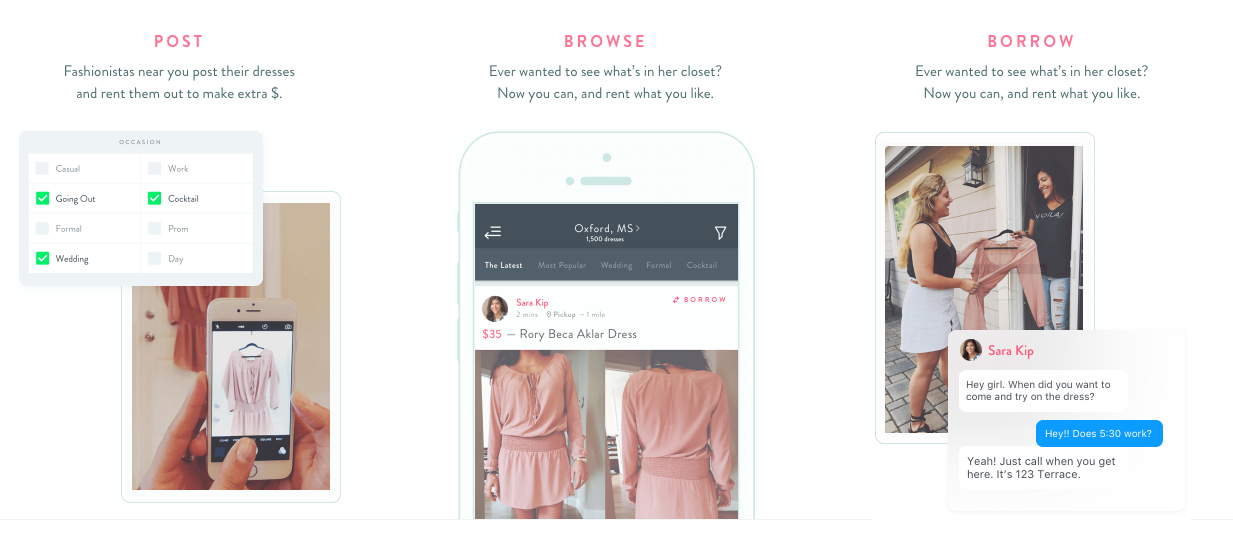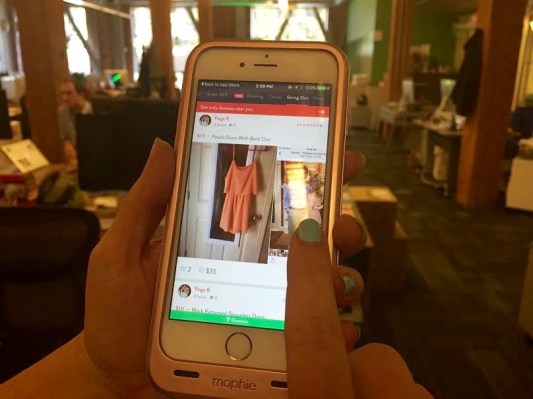Consider yourself stylish? Those with good taste and a wardrobe to match could find themselves getting richer for it with a new peer-to-peer clothing rental platform from Y Combinator’s latest batch.
Called Curtsy, the startup began when one University of Mississippi sorority sister realized she could earn a living by renting out her closet full of dresses to the rest of Greek row.
Curtsy is a bit like Rent-the-Runway, except you’re browsing for dresses from your neighbor’s wardrobe and then heading over to try them on and possibly wear one of them the same day.
The concept soon became very popular across campus, picking up 3,000 mostly female users and spawning a number of side businesses, according to the team behind the platform.
Mary Margaret Tardy, who joined when a sorority sister told her about the idea, was one of those women soon finding herself with a thriving dress rental business.
“I have this one dress that I put up at the beginning of the startup, and it has been rented almost every week since then,” Tardy told me. “I jokingly call it my ‘greatest investment’ because I have made so much more money off of renting the dress than I actually paid for the dress.”
Sara Kiparizoska, Curtsy’s original founder, has since gone on to medical school to become an OB/GYN, but left her startup in the hands of her friends, Eli Allen, William Ault and David Oates — three dudes who never imagined they’d end up in the dress business.
But the three clearly saw the value in the idea. “I shop for clothes once a year,” explained Ault. “My girlfriend shops once a week.”
I jokingly call it my ‘greatest investment’ because I have made so much more money off of renting the dress than I actually paid for the dress. Mary Margaret Tardy, Curtsy user
Adding to that, Oates informed me the women in Curtsy’s initial college campus market need at least 20 dresses a year for events and formal occasions, particularly if they’re involved in the Greek system — 3,000 initial users in need of a dress at least 20 times a year seemed like a good opportunity to capitalize on.
But there’s no mention of the founders, now all men, on the site for a reason — the target audience might conclude a bunch of guys wouldn’t get them or what they’re looking for. All the pictures and blog posts feature women, too.

Ault assured me the original founder is still involved until this December and that his team hires plenty of women — they are hiring engineers right now — and he makes sure to get a lot of feedback from Curtsy’s female user base. “We’re actually outnumbered,” said Ault.
Oates, for his part, has a background in on-demand delivery — he jokingly boasted to me he was the number one DoorDash delivery driver in San Francisco last summer and once got to deliver to Sam Altman’s house. “I was just trying to keep it cool,” Oates said about knocking on his dream tech leader’s door. But he also pointed out the experience helped teach him about the two-sided local delivery business.
However, there’s no delivery mechanism within Curtsy. Instead, all the college women looking for and renting out dresses are within a mile radius of each other so they can easily pop over to see the outfits available in person and take them home if they find something that works.
The college route seems to be working for now — it took off at Ole Miss and the team is working on expanding as soon as possible to other college campuses nationwide. But the team will need to retain those users once they graduate — something hard for startups to do when just focusing on the college crowd.
“We think winning that college market is going to put us in a really good spot to go up market, expand into cities and target our aging customer base,” Allen said about the next phase for the startup.
Curtsy plans to focus on college women, particularly in the South, as its target market until next year. However, anyone (men included) can sign up and download the app right now and start viewing local dresses — or start renting them out — in their area.
